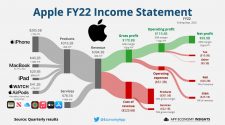Daniel Indiviglio over at The Atlantic discusses the potential for eliminating all secondary markets in live event tickets:
If you have ever sold even[t] tickets through the online resale market StubHub, then you may have received an e-mail last week about the dangers of paperless tickets. It cautions that companies “like Ticketmaster” are moving to restrictive paperless ticketing systems, which could kill the secondary market for tickets….According to the Fan Freedom Project, a group speaking out against this product that StubHub links to in its email, there are essentially two kinds:
Restricted transfer (closed-loop system): Primary ticketing agencies have sole control over sales, restricting the transfer of tickets and allowing them to be resold only on their own proprietary exchanges – and with their price restrictions which are often unrelated to the market value of the ticket.
Prohibition of ticket transfer: You purchase paperless tickets with a credit card and must provide the same credit card and a photo ID at the event venue. A swipe of the credit card at the gate produces a slip confirming the location of the reserved seat. The ticket cannot be transferred, sold or given away to another consumer.
Hmm…this sounds suspiciously like book publishers’ plans to undermine libraries and software companies’ recent progress in eliminating the secondary market for software. Doesn’t anybody want to actually own anything anymore?
Wired’s David Rowan certainly thinks renting rather than owning is the wave of the future, as I discussed in a previous post. However, Rowan’s analysis focused on the “idling capacity” of personal assets (e.g., a lawnmower that you only use once a week) and how the Internet is helping individuals coordinate more efficient arrangements (e.g., sharing that lawnmower among a wide group of “neighbors”). The idea here is to increase asset utilization and thus maximize the consumer surplus. (To round off the example: lawn mower manufacturers may be upset, but the economy is better off overall since resources are freed for more productive uses than making a ton of lawnmowers that will only be used for 2 hours per week.)
In contrast, eliminating secondary markets in tickets, books, and software only benefits the producer surplus. It allows de facto monopolies (like Ticketmaster for live event tickets) and copyright monopolies (like those enjoyed by publishers of books and software by virtue of their rightful copyrights) to extend those monopolies over the entire market (since they no longer have to compete with resold tickets, used books, and previously owned software). Under these circumstances, offering consumers something less than full ownership in their tickets, books, and software doesn’t benefit the economy — it simply increases monopoly, expanding inefficiency and the deadweight loss triangle.
For copyrighted works, the first sale doctrine was supposed to prevent owners from eliminating secondary markets, but that doctrine is under judicial attack. As for tickets, it remains to be seen whether established industry players like Ticketmaster will be able to further their monopolies by choking off the secondary market. But it doesn’t look good for consumers — or economic efficiency.

















